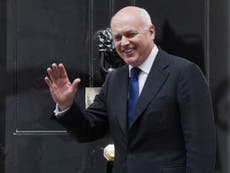The Independent's journalism is supported by our readers. When you purchase through links on our site, we may earn commission.
These are the scariest examples of cultural appropriation in this year's Halloween costumes
Bonus points if you’re in a couple and you’ve reduced years of shameful oppression to nothing more than a BDSM costume

Want to know the scariest thing about Halloween? The fact that in the 21st century we have a holiday where cultural appropriation is deemed to be totally acceptable. On the 1st of November, as you scroll through Facebook, Instagram and Twitter you’ll most probably find countless pictures of Halloween costumes and without a doubt there is bound to be a few people who cross the line. Offensive costumes and cultural appropriation has become entrenched within the holiday itself and what was once a day remembered for children trick or treating is now just a celebration of distasteful and borderline racist outfits.
By definition cultural appropriation is the adoption or use of elements of one culture by members of a different culture as a largely negative phenomenon. Now, I completely accept that many people innocently purchase costumes and don’t tend to think too much about it - but equally, the buying and wearing of some costumes does inherently mock other cultures and promote racism. Don’t believe me? Take the following examples:
Indian
ASOS, the online fashion and beauty store, came under fire last week for listing a range of bindis as “Halloween” items. The packaging made no reference to the bindis being used for Halloween, yet ASOS seemed to have put them under the Halloween section of their website. Needless to say, many shocked shoppers took to Twitter to accuse the company of cultural appropriation and insensitivity.
Native American
The classic example of cultural appropriation is the ‘sexy’ Native American costume, such as this HalloweenCostumes.co.uk example which promises to “turn you into a Native American princess” (“Check out our Indian costume accessories to add a tomahawk or a peace pipe accessory!”) White people’s history of raping, brutalising and driving Native Americans off of their own land is openly mocked when companies market these sexualised, offensive costumes to white girls. Sticking on a Native American headdress becomes as quick, easy and guilt-free as a Playboy bunny tail.
Arabic
Remember when Chris brown decided to wear a thawb - a traditional Arab robe - and attend a Halloween party as a member of the Taliban? Don’t get me wrong; I have no issues with mocking terrorists. But the attire itself is an integral part of the Arab culture, and using it in the way Chris Brown did epitomises the cultural appropriation debate. Equating Arab dress with terrorists and extremism is another tired example of how your Halloween costume really isn’t that innocent. But hey, if you’re still in the market for Arabic mockery, this site has your back with a fancy dress costume that even comes with a fake beard.
Slaves
After the success of 12 Years a Slave, a popular costume double-up seen around Halloween parties was the slave and slave master. I can’t even bring myself to explain why that’s inappropriate but apparently it’s all okay because it’s Halloween. Bonus points if you’re in a couple and you’ve reduced years of shameful oppression to nothing more than a BDSM costume.
Blackface
Every Halloween, we get another story about someone who apparently just wandered in to the 21st century from a very long time ago and thinks it’s cool to conduct their own minstrel show for japes. This year RT reported that Halloween HQ’s Northern Ireland branch was selling black-up facepaint alongside its skulls and fake blood as though black people are the same as fictional horror items. Good show, guys.
The ‘We’re a culture, not a costume’ campaign run in America was a fantastic way of trying to tackle the issue of cultural appropriation during this time of year. Needless to say, the tag line “You wear the costume for one night. I wear the stigma for life” is one that needs to be adopted here. It’s easy – oh, so easy - to say that “it’s just a costume”, but if you’re choosing to wear something from someone else’s culture as a “scary” accessory this Halloween, you either don’t care that you’re potentially offending people or that’s exactly what you’re trying to achieve.
Top tip: if you’re asking yourself if your costume is offensive, the answer is most probably yes.


Join our commenting forum
Join thought-provoking conversations, follow other Independent readers and see their replies